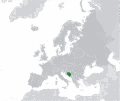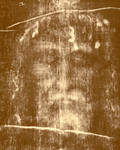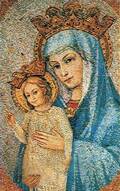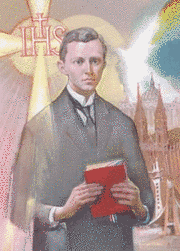BOSNIA HERZEGOVINA - BOSNA I HERCEGOVINA
Pope St John Paul II was twice a pilgrim to Bosnia Herzegovina: in 1997 and 2003. Pope Francis followed in his footsteps, visiting Sarajevo on Saturday 6th June 2015.
Medjugorje, in Bosnia Herzegovina, has been a place of pilgrimage for several million people since June 1981, when Our Lady reportedly began appearing to 6 children.
Here below are responses to Totus2us podcasts given by Bosnian Herzegovinians - many thanks to you ♥
To download the free mp3 audio recordings individually, right/double click on the play buttons - Za preuzeti besplatno mp3 audio snimke pojedinačno, desno / dvostruki klik na play butto.
Father Danko Perutina, a Franciscan priest from Mostar and currently in the parish of Međugorje, talks about his vocation to the priesthood:
"There was a big battle inside me and I couldn't support this. One day, after Communion, I sat down in the last bench in an old church in Mostar and I told Jesus, "Jesus, I will die a healthy sportsman, because I can't support this pressure. And I have to decide and right now I decide, I will become your priest." At that moment, I felt like a burden of about 500 kilos that had been on my shoulders just disappeared. And at that time I saw that I guessed. Now I have been a priest for 11 years, I am 41 years old and if I had to be born 100 times I would choose to become a Franciscan priest, because I am very happy, as a priest, as a Franciscan and as a man, because Jesus calls me and gives me the grace to say 'Yes, I go with you'. ... If somebody is in the cross to be or not to be a priest or not, I recommend do not be afraid, go ahead, and Jesus will give you big grace. What's important - don't be afraid."
"Our Lady, Mary, or Maria as you say in Bosnian, she's my mother, she's my heavenly mother with extraordinary love for us. She sacrificed her only son for us and she's absolutely my guide, my love. I turn to her for just everything I need in my life and for my children."
"Our Lady is the one who brings us, me, to Jesus."
Maria gives her Nešto o Gospa in English & Croatian.
If you'd like to give your something about Mary,
please do get in touch with the Totus2us team
- as well as hopefully bringing you joy,
you'd be really helping Totus2us ♥
"Totus tuus ego sum et omnia mea tua sunt.
Accipio te in mea omnia. Praebe mihi cor tuum, Maria." - St Louis de Montfort
Saint John Paul II took his motto Totus Tuus from this quote.
"I am totally yours and all that I have is yours.
I accept you for my all. O Mary, give me your heart.”
Pope St John Paul II's reflection on his 1997 pilgrimage to Sarajevo
General Audience, Wednesday, 16 April 1997 - in Croatian, English, French, German, Italian, Portuguese & Spanish
"1. Sanctus Deus, Sanctus fortis, Sanctus immortalis — miserere nobis.
“Holy God, holy and powerful, holy and immortal, have mercy on us.
From pestilence, hunger and war, deliver us, Lord.
From sudden death, deliver us Lord.
Sinners, we implore you, hear us, Lord.
Jesus, forgive us. Jesus hear us. Jesus have mercy on us.
Mother, beseech. Mother, implore. Mother, intercede for us.
All you saints of God, intercede for us”.
These invocations, dear to the Christian people, accompanied me during my journey to Sarajevo, my stay in that city and my meeting with the Christian community living there. The words “symbolic city” recurred several times. In fact, Sarajevo is the symbol of the European crises. From there the First World War broke out in 1914 and, towards the end of the century, Sarajevo once again has become the symbol of the tragic and senseless war that divided the Southern Slavs, the former Yugoslav nations, causing huge numbers of human victims. That is why Sarajevo has become the city of cemeteries. Next to the stadium where I was able to preside at the Eucharistic celebration on Sunday, 13 April, cemeteries can be clearly seen with the still fresh graves of the victims of the recent conflict. How can we forget that in recent years, almost every day we have been shown heart-rending pictures of mothers or young people kneeling at the graves of their husbands, fathers or fiancés? That is why I wanted forcefully to repeat in Sarajevo what Paul VI said many times, and I myself had stressed in my Message to the Secretary-General of the United Nations: “No more war! Never again!” (Insegnamenti XVI/1, 1993, 564; L'Osservatore Romano English edition, 17 March 1993, p. 1).
“From pestilence, hunger and war, deliver us, Lord”.
2. The idea of visiting Sarajevo came to mind several years ago, when warfare was rapidly spreading in that region. I longed to go to that city and I did everything in my power to do so. But since every effort was in vain, I repeatedly organized meetings of prayer and petition in Rome, Castel Gandolfo and Assisi, invoking peace for those tormented lands. I wanted such fervent prayers to show our brothers and sisters in Bosnia-Hercegovina, Christians or Muslims, Croats or Serbs — that they were not alone: that we were with them and that we would continue to be with them until peace returned to their country. The inhabitants of Sarajevo remembered all this and several times during my visit they told me so. They knew that the Church, not only in Europe but throughout the world, was with them; they knew that they had not been abandoned. And this certainly gave them moral support.
The Church’s persevering solidarity was also shown in the elevation of my venerable Brother Vinko Puljiæ, Archbishop of Sarajevo, to the rank of Cardinal in the Consistory of 1994.
During the visit I wanted to stress this ecclesial communion by also meeting the other Bishops of Bosnia-Hercegovina: Bishop Franjo Komarica of Banja Luka, and Bishop Ratko Periæ of Mostar-Duvno.
Pilgrimages of the faithful to the Marian shrines in Bosnia-Hercegovina and in many other parts of the world, especially in Loreto, continued throughout the war to ask the Mother of nations and the Queen of peace to intercede so that peace would be restored to that tormented region.
“Mother, beseech! Mother, implore! Mother, intercede for us! All you saints of God, intercede for us!”
3. My entire Pastoral Visit to Sarajevo was marked precisely by this incessant prayer for peace, from Saturday evening to Sunday afternoon, 12-13 April. Every stage of the programme intended to emphasize one principal message: hope. From my arrival at the airport to the meeting in the cathedral of Sarajevo with the Bishops, clergy and religious, to the highlight of the visit, which was the Mass concelebrated with the Cardinals, Bishops and priests of Bosnia-Hercegovina and the other States of the former Yugoslavia, and of many countries in Europe and the world, I wanted to bring words of hope to the inhabitants of the city and of the entire country. After the painful experience of the war, which caused injustices and has left revenge and hatred in its wake, hope takes the concrete form of forgiveness and reconciliation. I urged all the ethnic and religious communities of Bosnia-Hercegovina, profoundly marked by suffering, to forgive and be reconciled, and I have prayed that they will be able to say to one another: “We forgive and we ask for forgiveness”. Reconciliation and dialogue is the only way to lasting peace.
At the meeting with the clergy I could not refrain from mentioning the particular merits of the Franciscan Order in the evangelization of that country, especially under Ottoman rule, and at the same time I urged all diocesan clergy and religious to work together in solidarity under the guidance of their own Bishops. In my homilies and speeches I wanted to thank those who have supported me in various ways and continue to support the suffering peoples of Bosnia-Hercegovina. Nor did I neglect to appeal to the political, economic and military authorities of Europe not to forget the urgent needs of that country, so tried by the war.
During Mass in the stadium of Sarajevo, the Liturgy of the Word for the Third Sunday of Easter presented to us Christ, our advocate before God. Sarajevo, Christ is your advocate in a very special way! He is your advocate, all you nations that once belonged to the Yugoslav Federation. He is your advocate, dear European continent; he is your advocate, peoples of the earth!
Peace, which is born of reconciliation and forgiveness, is the essential concern of every believer. This spirit of unity, forgiveness and reconciliation in the light of faith gave a special eloquence to the meetings I had with the representatives of the Orthodox Church and of the Muslim and Jewish communities. I wished to award the Pope John XXIII International Peace Prize to the humanitarian organizations of the Episcopal Conference’s Caritas, the Muslim Merhamet, the Serbian Orthodox Dobrotvor and the Jewish La Benevolencjia —which are particularly praiseworthy for their assistance to the war victims.
4. Lastly, I would like to thank the authorities of Bosnia-Hercegovina for their invitation to visit Sarajevo and for all they did during my visit. Following a peace treaty, Bosnia-Hercegovina has been placed under the authority of a specific triumvirate: governed by three presidents, one of whom represents the Muslim community, another the Orthodox Serbs, while the third represents the Catholic community consisting particularly of Croats. I had the opportunity to meet this triumvirate and to discuss with each president the issues most important for the country at the present time. Through the President of the triumvirate, Mr Izetbegoviæ, I express my feelings of gratitude to all. We will take pains to carry out the desires expressed in the discussions with regard to the Apostolic See, so as to continue to serve the good of these sorely tried people.
“Jesus, forgive us. Jesus hear us. Jesus have mercy on us.
Mother, beseech. Mother, implore. Mother, intercede for us.
All you saints of God, intercede for us”.
With these petitions I end my reflection, beseeching God yet again: “Deliver us, Lord, from pestilence, hunger and war!”.
Let us give thanks for the peace which has finally been achieved and let us pray that it will last. Let us pray that people will never again yield to the dangerous temptation to solve important problems between individuals and nations by armed conflict. May they be resolved only through dialogue and agreement."
The Vatican's biography on Ivan Merz
Banja Luka - in Croatian, English, Italian, Portuguese & Spanish
"Ivan Merz was born in Banja Luka, Bosnia, on 16 December 1896, and was baptized on 2 February 1897. He attended elementary and middle school in Banja Luka and, after a brief period of education at the military academy of Wiener Noustadt, he enrolled in 1915 at the University of Vienna, with the dream of teaching young people in Bosnia; thus, he would be following the example of his professor, Ljubomir Marakovic, who helped Ivan to discover the richness of the Catholic faith.
In March 1916, Ivan was enlisted in the army and shipped to the Italian battle front, where he spent the greater part of two years beginning in 1917. The war experience and its horrors marked a turning point in Ivan's young life and contributed greatly to his spiritual growth, prompting him to abandon his future into God's hands and to strive with all his might towards the goal of Christian perfection.
On 5 February 1918, he wrote in his diary: "Never forget God! Always desire to be united with Him. Begin each day in the first place with meditation and prayer, possibly close to the Blessed Sacrament or during Mass. During this time, plans for the day are made, one's defects are put under examination and grace is implored for the strength to overcome all weakness. It would be something terrible if this war had no meaning for me!... I must begin a life regenerated in the spirit of this new understanding of Catholicism. The Lord alone can help me, as man can do nothing on his own". At this time, Ivan also made a private vow of perpetual chastity.
After the war, he continued his studies at Vienna (1919-20), and then in Paris (1920-22). In 1923 he obtained a degree in philosophy. His thesis was entitled "The influence of the Liturgy on the French authors". He then became a professor of language and French literature and was exemplary in his dedication to the students and to his responsibilities as a teacher.
In his spare time he studied philosophy and theology and deepened his knowledge of the documents of the Magisterium of the Church.
Ivan was especially noted for his interest in young people and concern for their growth in faith and holiness. He started the "League of Young Croatian Catholics" and the "Croatian League of Eagles" within the Croatian Catholic Action Movement. Their motto was: "Sacrifice Eucharist Apostolate".
For Ivan, the purpose of this organization was to form a group of front-line apostles whose goal was holiness. The scope of this goal also flowed over into liturgical renewal, of which Ivan was one of the first promoters in Croatia.
As a Catholic intellectual, Ivan was able to guide young people and adults to Christ and His Church through his writings and organized gatherings. He also sought to teach them love and obedience to the Vicar of Christ and the Church of Rome.
In the face of any misunderstandings and difficulties, Ivan always had an admirable patience and calm, the fruit of his continual union with God in prayer. Those who knew him well described him as a person who had his "mind and heart immersed in the supernatural". Convinced that the most effective way to save souls was through efficacious suffering, he offered to God all his physical and moral sufferings, particularly for the intention of the success of his apostolic endeavours.
Shortly before his death, he offered his life for the youth of Croatia. In short, the young man believed that his vocation was very simply "the Catholic faith".
Ivan Merz died on 10 May 1928 in Zagreb. He was 32 years old."




